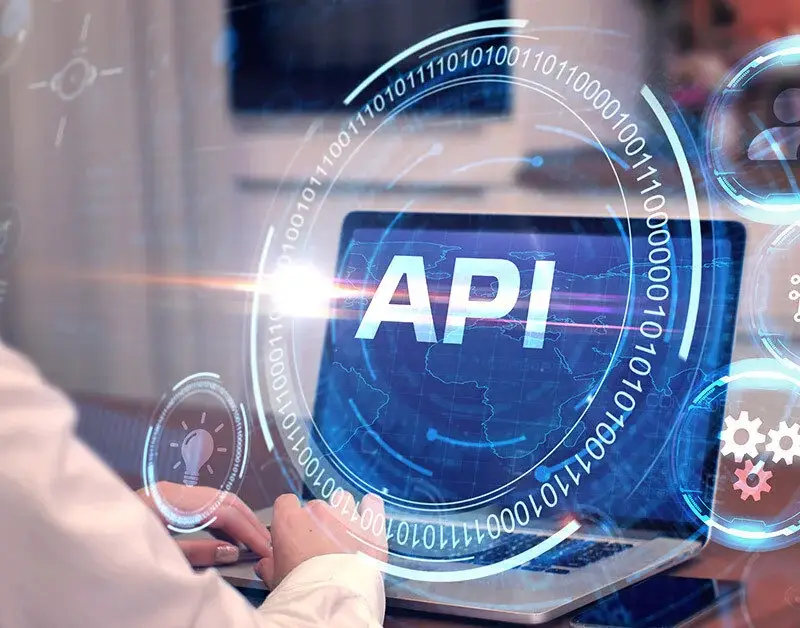API Development
Our Happy Clients











API DEVELOPMENT AGENCY

ENHANCE YOUR API WEBSITE
Optimize Data Flow and Integration
Tailored Design for Developer-Friendly Experience
Fortified Security Measures
See more conversions into leads and customers
Are you ready to see your revenue skyrocket?
API Development - Website Design Service
Custom API Solutions
Our team specializes in creating tailor-made APIs to meet your specific business requirements. Whether it's for web or mobile applications, we design APIs that facilitate seamless data exchange and integration with third-party services.
RESTful API Development
We specialize in developing RESTful APIs, a widely used architectural style for designing networked applications. Our services focus on creating APIs that are scalable, flexible, and adhere to industry best practices.
API Integration and Optimization
We excel in integrating APIs into your existing systems and optimizing them for maximum efficiency. Our experts ensure that APIs work harmoniously, enabling smooth communication between different software components.
Security and Authentication
Security is paramount in API development. We implement robust authentication methods and security protocols to safeguard your data, ensuring that your APIs are protected against unauthorized access and potential threats.
API DEVELOPMENT PROCESS
Requirement Analysis and Planning
Thoroughly analyze the project requirements, defining the scope, objectives, and desired outcomes. Create a comprehensive plan outlining the API's design, functionality, and integration points.
Design Architecture and Endpoint Definition
Design the API architecture, including the identification of endpoints and data structures. Define how different components will interact and establish clear communication channels for seamless data flow.
Data Modeling and Schema Design
Develop the data models and database schemas that will support the API. This step is crucial for organizing and structuring data in a way that facilitates efficient retrieval and manipulation.
API Development and Implementation
Begin the actual coding process, creating the endpoints, request handling, and response generation. Follow best practices to ensure clean, maintainable code that adheres to industry standards.
Testing and Quality Assurance
Conduct thorough testing of the API to identify and rectify any bugs or issues. Perform unit tests, integration tests, and stress tests to ensure the API functions reliably under various conditions.
Documentation and Endpoint Documentation
Generate comprehensive documentation for the API, including details on endpoints, request/response formats, authentication methods, and usage examples. Clear documentation is essential for developers who will be using the API.
Security Implementation and Authorization
Implement security measures to protect the API against unauthorized access and potential threats. This includes setting up authentication methods, access controls, and encryption protocols.
Deployment and Monitoring
Deploy the API on a live server or cloud platform, ensuring it's accessible to users. Set up monitoring and logging tools to track API usage, identify performance bottlenecks, and address any issues promptly.

Requirement Analysis And Planning
Thoroughly analyze the project requirements, defining the scope, objectives, and desired outcomes. Create a comprehensive plan outlining the API's design, functionality, and integration points.

Design Architecture And Endpoint Definition
Design the API architecture, including the identification of endpoints and data structures. Define how different components will interact and establish clear communication channels for seamless data flow.

Data Modeling And Schema Design
Develop the data models and database schemas that will support the API. This step is crucial for organizing and structuring data in a way that facilitates efficient retrieval and manipulation.

API Development And Implementation
Begin the actual coding process, creating the endpoints, request handling, and response generation. Follow best practices to ensure clean, maintainable code that adheres to industry standards.

Testing And Quality Assurance
Conduct thorough testing of the API to identify and rectify any bugs or issues. Perform unit tests, integration tests, and stress tests to ensure the API functions reliably under various conditions.

Documentation And Endpoint Documentation
Generate comprehensive documentation for the API, including details on endpoints, request/response formats, authentication methods, and usage examples.

Security Implementation And Authorization
Enhance API security by implementing robust authentication, access controls, and encryption protocols to thwart unauthorized access and potential threats.

Deployment And Monitoring
Deploy the API on a live server or cloud platform, ensuring it's accessible to users. Set up monitoring and logging tools to track API usage, identify performance bottlenecks, and address any issues promptly.

Maintenance and Updates
Our API development services include ongoing maintenance and updates. We ensure your APIs remain efficient, secure, and compatible with evolving technology, guaranteeing seamless integration and optimal performance for your business.
WHY SHOULD YOU make website into API?
Seamless Integration Capabilities
Transforming your website into an API enables seamless integration with other applications and platforms. This empowers your business to expand its reach, enhance user experience, and streamline operations through effective data communication.
Empowering Third-Party Developers
By offering an API, you empower third-party developers to create innovative applications and services that can interact with your website's functionalities. This fosters a collaborative ecosystem, driving innovation and expanding your brand's influence.
Enhancing Accessibility and Flexibility
An API allows for programmatic access to your website's features and data, making it accessible to a broader range of devices and applications. This increased accessibility enhances user convenience and expands the potential use cases for your services.
Future-Proofing Your Business
Adopting an API-first approach future-proofs your business by enabling adaptability to evolving technologies and market trends. It provides the foundation for agility and innovation, ensuring your digital presence remains competitive in the dynamic landscape of technology.
Frequently Ask Questions


